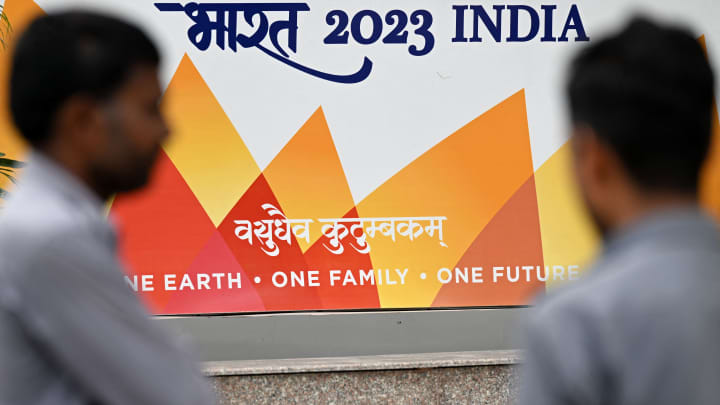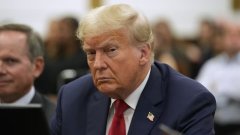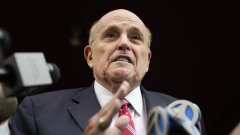
A dinner invitation has rarely sparked such a buzz.
The streets of India's capital were rife with speculation Wednesday that the government might be about to scrap the use of the country's English name — a dramatic new step in an effort to break with its colonial heritage and appeal to its hard-line base.
The rumors were fueled by a state-issued invite to a dinner reception for world leaders during next weekend's , which referred to the country's head as the "President of Bharat" — the Hindi or Sanskrit version of the word "India."
"Better late than never," Akash Tiwari, a private security officer in New Delhi, told NBC News of the rumored change. "It used to be Bharat before. The change is good," he added.
But there was also vocal criticism, with opposition figures decrying what they said would be a cynical and self-defeating distortion of the country's identity.
For months ahead of the summit, visitors have been welcomed to the host's capital city with a bright logo that references the country's two official names, "Bharat" in Hindi or Sanskrit, and "India" in English.
The country's constitution references both names: India to be used for statements in English and Bharat to be used in Hindi. The country is also called Hindustan, which many right-wing Hindu groups have called for to be the official name.
Notably, all names have been in use long before the colonial era. The name India was derived centuries ago in connection to the Indus Valley, which lies in the northwest part of the country.
More from NBC News:
Since Prime Minister took office in 2014, his nationalist government has been pushing to change colonial names across streets and venues of what it says are the remnants of a legacy of slavery.
Supporters say the name will help move past a colonial mentality.
"The meaning is the same, be it Bharat, Hindustan or India," said Amit Gihar, a fashion photographer. "Now we get to use it in our own language. We feel pride in saying it" said Gihar, 23, speaking in Hindi.
Many were also left wondering what a person from the country should be referred to in English, as in Hindi citizens are often called "Bharati" or "Bharatiyan."
Some were also bewildered about the government's priorities.
"The government shouldn't remove it. India is a very old name," said Vijender Singh, 28, who's been driving rickshaws around the capital for three years. He said that the president's focus should be on work and facilities for poor people.
Critics also say it's another attempt by the government to impose Hindi as the national language, and for the BJP to advance its own agenda. The Indian Constitution lists 22 existing languages, but none of them have been given the status of the national language.
According to a decade-old census, Hindi was not the majority language, even though it was spoken by 44% of the people.
Two months ago, the opposition parties came together to form an alliance called "INDIA," which they said stands for Indian National Developmental Inclusive Alliance. They hope to oust the BJP from government in next year's election.
"I hope the government will not be so foolish as to completely dispense with India, which has incalculable brand value built up over centuries," Shashi Tharoor of the opposition Congress party posted on X, formerly known as Twitter.
Later he sarcastically suggested the opposition alliance could also change the name to BHARAT, standing for "Betterment, Harmony And Responsible Advancement for Tomorrow."
"Then perhaps the ruling party might stop this fatuous game of changing names," he said.
India's Foreign Minister Subrahmanyam Jaishankar dismissed criticisms in an interview with the ANI news agency, saying, "India, that is Bharat, it is there in the constitution. Please, I would invite everybody to read it."




